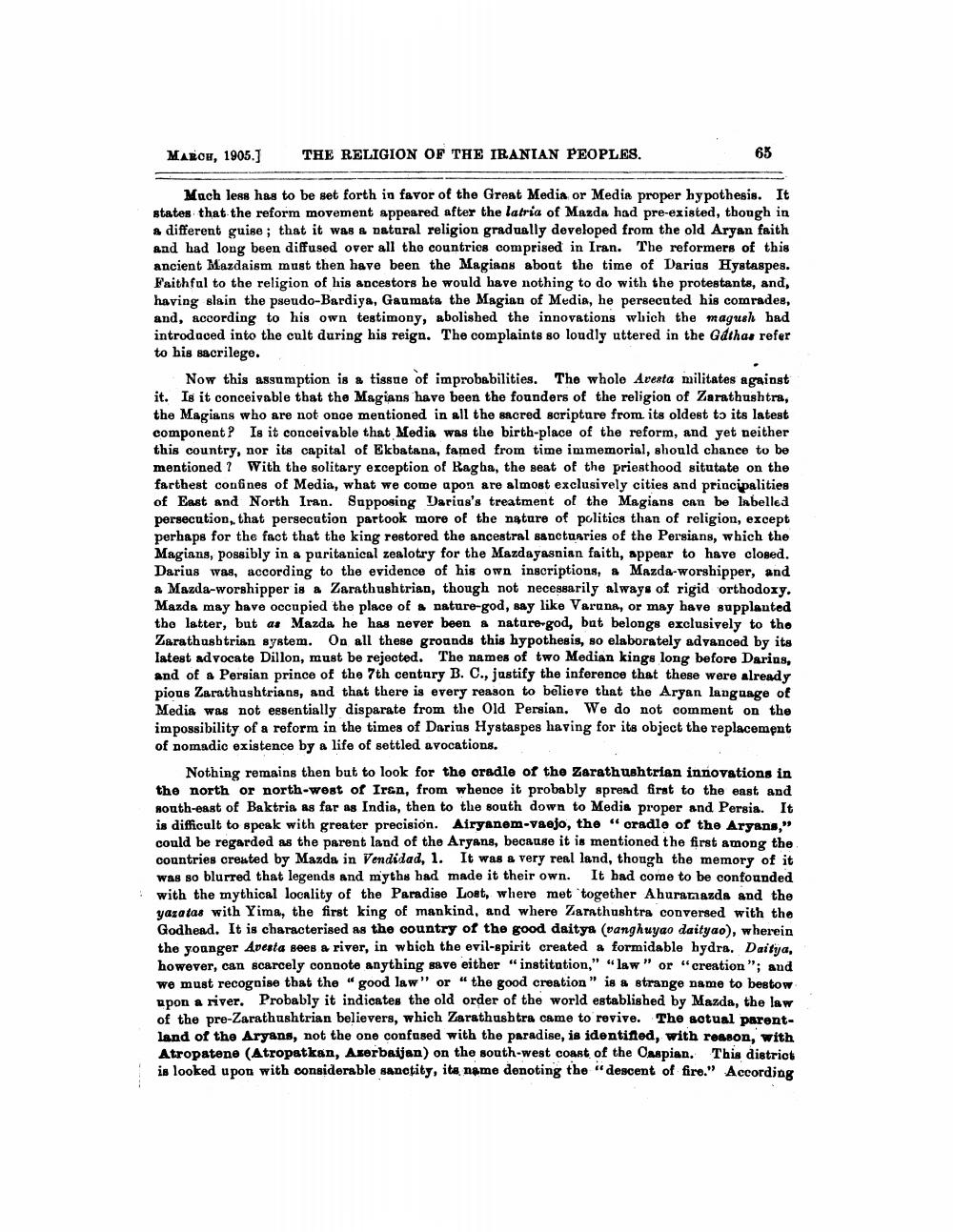________________
MARCU, 1905.)
THE RELIGION OF THE IRANIAN PEOPLES.
65
Much less has to be set forth in favor of the Great Media or Media proper hypothesis. It states that the reform movement appeared after the latria of Mazda had pre-existed, though in a different guise ; that it was a natural religion gradually developed from the old Aryan faith and had long been diffused over all the countries comprised in Iran. The reformers of this ancient Mazdaism must then have been the Magians about the time of Darius Hyataspes. Faithful to the religion of his ancestors he would have nothing to do with the protestants, and, having slain the pseudo-Bardiya, Gaumata the Magian of Media, he persecuted his comrades, and, according to his own testimony, abolished the innovations which the magush bad introdaced into the cult during his reign. The complaints so loudly uttered in the Gdthas refer to his sacrilege.
Now this assumption is a tissue of improbabilities. The whole Aresta militates against it. Is it conceivable that the Magians have been the founders of the religion of Zarathushtra, the Magians who are not once mentioned in all the sacred scripture from its oldest to its latest component? Is it conceivable that Media was the birth-place of the reform, and yet neither this country, nor its capital of Ekbatana, famed from time immemorial, should chance to be mentioned ? With the solitary exception of Ragha, the seat of the priesthood situtate on the farthest confines of Media, what we come apon are almost exclusively cities and principalities of East and North Iran. Supposing Darius's treatment of the Magians can be labelled persecution, that persecution partook more of the nature of politics than of religion, except perhaps for the fact that the king restored the ancestral sanctuaries of the Persians, which the Magians, possibly in a puritanical zealotry for the Mazdayasnian faith, appear to have closed. Darius was, according to the evidence of his own inscriptions, & Mazda-worshipper, and a Mazda-worshipper is a Zarathushtrian, though not necessarily always of rigid orthodoxy. Mazda may have occupied the place of a nature-god, say like Varana, or may have supplanted the latter, but as Mazda he has never been a nature-god, but belongs exclusively to the Zarathushtrian system. On all these grounds this hypothesis, so elaborately advanced by its latest advocate Dillon, must be rejected. The names of two Median kings long before Darins, and of a Persian prince of the 7th century B. C., justify the inference that these were already pious Zarathashtrians, and that there is every reason to believe that the Aryan language of Media was not essentially disparate from the Old Persian. We do not comment on the impossibility of a reform in the times of Darius Hystaspes having for its object the replacement of nomadic existence by a life of settled avocations.
Nothing remains then but to look for the cradle of the Zarathushtrian innovations in the north or north-west of Iran, from whence it probably spread first to the east and south-east of Baktris as far as India, then to the south down to Media proper and Persia. It is difficult to speak with greater precision. Airyanem-vaejo, the "cradle of the Aryans," could be regarded as the parent land of the Aryans, because it is mentioned the first among the countries created by Mazda in Vendidad, 1. It was a very real land, though the memory of it was so blurred that legends and myths had made it their own. It had come to be confounded with the mythical locality of the Paradise Lost, where met together Ahuramazda and the yazatas with Yima, the first king of mankind, and where Zarathashtra conversed with the Godhead. It is characterised as the country of the good daitya (vanghuyao daityao), wherein the younger Avesta sees a river, in which the evil-spirit created a formidable hydra. Daitia, however, can scarcely connote anything save either "institution," "law" or "creation"; and we must recognise that the "good law" or "the good creation" is a strange name to bestow upon a river. Probably it indicates the old order of the world established by Mazda, the law of the pre-Zarathushtrian believers, which Zarathushtra came to revive. The actual parentland of the Aryans, not the one confused with the paradise, is identified, with reason, with Atropatene (Atropatkan, Azerbaijan) on the south-west coast of the Caspian. This district is looked upon with considerable sanctity, its name denoting the "descent of fire." According




